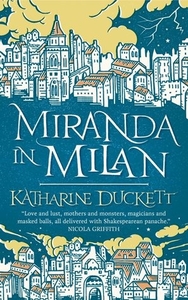Amazon Affiliate Link | Bookshop.org Affiliate Link
Out of all of Shakespeare’s comedies, The Tempest has always stuck out to me as particularly odd. The play’s initial premise hardly seems like it belongs in a comedy at all—an ousted duke raises his daughter alone on a magical isle, binding spirits to his will and planning his vengeance for a dozen years before wrecking the king of Italy’s flagship with a sorcerous storm. And Prospero’s plan indeed unfolds, Monte Cristo-like, exactly as he wills it. But while we see the magician conjure ghosts and minor deities to serve him, enchant people with magical sleep and paralysis, and master the very elements of the isle, the play wraps up with the same brotherly reunions, marriage engagements, and heartfelt speeches as any of the Bard’s other comedic productions.
Author Katharine Duckett must have been just as intrigued by this curious juxtaposition as I am, because her debut novella Miranda in Milan explores precisely what happens after Prospero and his daughter Miranda return to Italy. Miranda in Milan is a direct sequel to The Tempest, staying faithful to the events in Shakespeare’s play but assuming that (written and staged as it is, largely from Prospero’s perspective) it may be the account of a somewhat unreliable narrator. Instead, Duckett gives us Miranda’s point of view. Miranda is a fascinating and compelling character for how little time she actually spends on stage—John William Waterhouse’s classic painting Miranda–The Tempest showcasing how much space she occupies in our collective imagination of the play. In Miranda in Milan, Duckett asks the very pertinent question, “what does a sorcerer’s daughter, who has lived practically alone on an island for almost all her life, do when suddenly brought to one of the largest cities in sixteenth-century Italy?”
The answer, delightfully, is that she falls in love with a Moorish witch working as a chambermaid in the Milanese castle. Together, the two of them are forced to solve the mystery surrounding Prospero’s exile. Was it truly ambition that led Antonio to betray his brother? And what ever happened to Miranda’s mother, who in all of The Tempest is mentioned only once? Miranda in Milan does a good job fleshing out the shadow that The Tempest casts, the context that either rings insincere or is brushed away in the original play. This includes some of the more problematic aspects of Shakespeare’s writing, gendered and racialized alike. The character of Caliban looms arguably larger out of Shakespeare’s pages than even Miranda does. Considering the amount of academic ink that has been spilled over Caliban in the past, I could see the argument that Duckett leaves him rather too conveniently out of sight. Personally, I found her portrayal of Caliban to be deeply sympathetic, with a clear influence on the story that ran throughout the novella. Duckett clearly set out to write a book about Miranda, but Miranda’s relationship to Caliban is an unavoidable aspect of her character, and I enjoyed how that informed the story.
Which brings me finally to Ferdinand, and possibly what I enjoyed most about Miranda in Milan. Like I mentioned earlier, Duckett doesn’t directly contradict anything in The Tempest; she merely expands and recontextualizes the events of the play. By all accounts, Ferdinand isn’t a bad man in either book—which is what makes Miranda’s journey such a compelling metaphor for the forces of compulsory heterosexuality. Miranda is raised never knowing another mortal woman. Her father, the civilized patriarch who “tamed” the feminine wilderness of Sycorax and the island, is her only source of information about the world and its workings. The same father regularly enchants her into slumber when it suits his purpose, and spends a great deal of the play manipulating her into falling in love with a man of his choosing—who, again, is literally the first person Miranda has ever seen outside the men she grew up around. Is that love? Would true love require such Herculean effort, the spells and stories and years of isolation, to produce? Or is it simply a role in a play, in which Miranda’s lines were written for her long ago? Even after Miranda becomes aware of the possibility of women loving each other, deviating from that script would cost Miranda the security, protection, and power of becoming queen of Naples by Ferdinand’s side—and earn Prospero’s tempestuous wrath. This choice will feel familiar to many lesbians in our society, and it is the choice that Miranda has to make in Milan.
I have a lot to say about Miranda in Milan for how slim a volume it is. Personally, I would have loved for the novella to engage with The Tempest on a metatextual level, not just a literal one (though there is a great line about how Prospero “always spoke as if he were performing,” which tickled me pink). I realize, however, that would probably turn the book into more of a deconstruction of The Tempest rather than a sequel, which Miranda in Milan excels at being. It’s fun, it’s cute, and it doesn’t take much longer to read than the original play. In my mind, this is just how The Tempest ends for me now.
Samantha Lavender is a lesbian library assistant on the west coast, making ends meet with a creative writing degree and her wonderful butch partner. She spends her spare time playing and designing tabletop roleplaying games. You can follow her @LavenderSam on tumblr.

